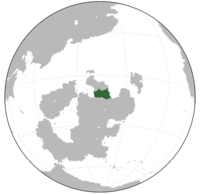Dejer
Saintly Republic of Dejer 𐐝𐐩𐑌𐐻𐑊𐐨 𐐡𐐮𐐹𐐲𐐺𐑊𐐮𐐿 𐐲𐑂 𐐔𐐩𐑈ı𐑉 (Dejerian alphabet) | |
|---|---|
| Anthem: God is our King | |
 | |
| Capital | Josephton |
| Largest city | Brigham |
| Official languages | Fluvan |
| Ethnic groups (2022) |
|
| Religion (2020) | Nephism (official) |
| Demonym(s) | Dejerian |
| Government | Federal theocratic Nephist republic |
| Frederick Adelson | |
| Wendell Bentelon | |
| John Pottenler | |
| Legislature | Synod |
| Independence from Fluvannia | |
• First Colonies | December 1847 |
| 1869-1910 | |
• Current Constitution | 6 June 1999 |
| Area | |
• Total | 557,480 km2 (215,240 sq mi) |
| Population | |
• 2021 estimate | 46,939,816 |
• 2013 census | 46,530,103 |
• Density | 84.2/km2 (218.1/sq mi) |
| GDP (nominal) | 2022 estimate |
• Total | |
• Per capita | |
| Gini (2022) | medium |
| HDI (2022) | high |
| Currency | Dejerian Mark (𐐣) (DMA) |
| Date format | mm-dd-yyyy |
| Driving side | right |
| Calling code | +990 |
| ISO 3166 code | DJ |
| Internet TLD | .dj |
Dejer, officially the Saintly Republic of Dejer (Dejerian alphabet: 𐐝𐐩𐑌𐐻𐑊𐐨 𐐡𐐮𐐹𐐲𐐺𐑊𐐮𐐿 𐐲𐑂 𐐔𐐩𐑈ı𐑉) is a country in northern Galia. It is bordered to the south by Ashmala, Balbaher, and Sahilban and is surrounded to the east and west by coastline, primarily dictated by the Achrinian Ocean. The country consists primarily of low lying tropical areas. With over 46.9 million people, Dejer is one of the largest countries in northern Galia. The largest city is Brigham bu the capital is Josephton on the northeast coast. Other major cities include New Jerusalem, Gospelton, and Marksville.
Just over three fifths of the population are Fluvan-speaking Fluvannians, a majority of whom are ethnic Fluvans though integration of other Fluvannian ethnicities means that large portions of the Dejerian population may not be ethnic Fluvans but believe themselves to be. The remaining population is primarily native Galians, most of whom are Aravian groups, the largest of which is the Sahilbanese group. In addition, considerable minorities of Onhsaneneans, Yawathans, and Alannans. The primary language is Dejerian Fluvan, a dialect of Fluvan that has its own unique accent and alphabet unique to the country. Only Fluvan has any official status in the country, though local governments sometimes deal in local languages as opposed to using Fluvan. In national politics, all laws and business are done in the Fluvan language.
Modern humans have lived in what is now Dejer for several thousand years, with various Aravian tribes making up the primary population. Several tribes formed a confederacy by the mid 1600s and were able to fight off the migrating and nomadic eastern Galian groups, such as the Dilanians and Yawathans. The Aravian Confederacy would come into contact with Fluvan-speaking Fluvannian traders sometime during in the late 1790s and maintained trading relations with this group. In 1847, the first group of Nephist settlers would arrive from Fluvannia. Despite intially peaceful relations, a series of wars in the country would sour relations and result in the smaller Aravian Confederacy being absorbed by the Fluvannians, who established the Saintly Republic of Dejer, a Nephist theocracy. During the early years of the Saintly Republic, considerable local autonomy was allowed to the Aravian natives and the Council of Presbyters supervised the democratic process and served in an advisory role. Despite Nephism being overtly favored, non-Nephists often existed as tolerated minority religions.
After the First Great War, where Dejer served as a neutral party, civic unrest resulted in Dejer joining the Yedinburg Pact amid severe democratic backsliding and increasing authoritarianism. Despite joining the Lauilliac Pact in the Third Great War, Dejer's government was not replaced by the Coalition, with Dejer exiting the war in 1980 after signing a separate armistice with the Coalition. Dejer's government remained a hybrid regime, becoming more and more authoritarianism under the rule of Patriarch Frederick Adelson, who was elected in 2002. Since July 2019, Dejer has been embroiled in a multi-sided civil war, with involvement of different countries. The civil war has been marked by brutality and war crimes and has devolved into a stalemate. Local and foreign powers have played major roles in the civil war, which remains a hot button issue in politics in the region who have attempted to intervene. As of 2023, three political entities – the Dejerian Interim Government, Aravia Anti-Colonial Movement, and the Aravian Autonomous Army – have emerged in Dejerian territory to challenge Adelson's rule.
The government of Dejer is a Nephist theocracy with a presidential system, though ultimate authority is vested in an autocratic Patriarch of All Dejer; the position has been held by Frederick Adelson since the death of his predecessor, Erik Stone in 2000. The Dejerian government is authoritarian, and has attracted widespread criticism for its significant constraints and violations of human rights and civil liberties. It is also a focal point for radical Nephism within northern Galia. Since the end of the Third Great War, Dejer has often had adversarial relations with many countries in Galia, such as Los Angeles, Onhsanenea, and Ashmala. Dejer is also considered to be one of the larger players in north Galian affairs, with its government having been involved in many local conflicts before the outbreak of civil war in 2019. Its aggressive foreign policy in the region, marked by sponsorship of numerous Nephist militant groups, has been widely condemned.
Dejer is generally considered a regional power, serving as a valuable base for MDP operations in northern Galia. It is considered a developing country. It has large reserves of natural resources and reserves but has suffered from corruption and political conflict in the country. The ongoing civil war has effectively halted extracton operations for natural resources in the country. Historically a multi-ethnic country, Dejer remains a pluralistic society comprising numerous ethnic, linguistic, and religious groups, but discriminatory laws and policies have increased in recent years, driving division between Fluvan colonists and Galian natives. The country is a member of the Global Community and Mutual Defense Pact.

